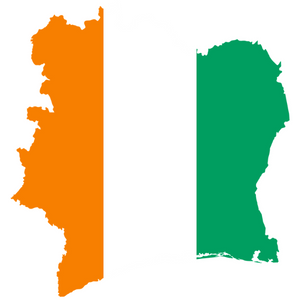Ivory Coast
Overview
West Africa's Rising Star
Situated on the Gulf of Guinea in West Africa, Ivory Coast, or Côte d'Ivoire as it's officially known, is a nation of contrasts and immense potential. With its rich history, diverse cultures, and strategic location, it has positioned itself as a key player in the West African economic landscape.
Historically known for its cocoa production, Ivory Coast is the world's leading exporter of cocoa beans, contributing significantly to the global chocolate industry. However, its economic tapestry extends beyond cocoa. The country is a major producer of coffee, palm oil, and rubber, making it a vital player in the global agricultural commodities market.
Abidjan, the economic capital, is a bustling metropolis reflecting the country's rapid urbanization and growth. With its modern skyscrapers, expansive port, and vibrant markets, it serves as a hub for business, trade, and culture in the region.

Culturally, Ivory Coast is a mosaic of over 60 ethnic groups, each with its unique traditions, languages, and festivals. This rich cultural heritage is celebrated through music, dance, and art, with the country being home to several UNESCO World Heritage sites.
In recent years, Ivory Coast has embarked on a journey of economic diversification and infrastructural development. Investments in sectors like telecommunications, energy, and manufacturing are testament to its forward-looking vision. The government's pro-business policies, coupled with a young and dynamic workforce, make it an attractive destination for foreign investment.
As Ivory Coast continues on its trajectory of growth and transformation, it presents a plethora of opportunities for investors and businesses. With its strategic location, abundant resources, and resilient spirit, Ivory Coast is undoubtedly West Africa's rising star.
Key indicators

Population

GDP per capita

Nominal GDP

Purchasing Power Parity GDP

Main export

Foreign direct investment

Stock market capitalization

GDP growth rate
- Economic Snapshot
- Business Environment
- Startup Ecosystem
- Infrastructure & Technology
- Opportunities & Challenges
- Cultural Insights
Ivory Coast is a West African country with a coast on the Atlantic Ocean. It is bordered by Guinea and Liberia to the west, Mali and Burkina Faso to the north, and Ghana to the east.
Ivory Coast is one of the fastest growing economies in Africa. The country's economy is largely dependent on agriculture, particularly cocoa. Ivory Coast is the world's largest producer of cocoa beans.
The Ivorian government is committed to economic diversification, and is investing in a number of sectors, including manufacturing, services, and tourism.
Ivory Coast's business environment has improved in recent years, but there are still a number of challenges. The country ranks 134th out of 190 countries in the World Bank's Ease of Doing Business Index.
The main challenges to doing business in Ivory Coast include:
- Corruption: Corruption is a major problem in Ivory Coast. The country ranks 105th out of 180 countries in Transparency International's Corruption Perception Index.
- Bureaucracy: The Ivorian bureaucracy can be complex and time-consuming to navigate.
- Infrastructure: Ivory Coast's infrastructure is underdeveloped, which can make it difficult and expensive to transport goods and people.
- Access to finance: Access to finance can be a challenge for businesses in Ivory Coast, especially small and medium-sized enterprises (SMEs).
Despite the challenges, Ivory Coast offers a number of opportunities for businesses. The country has a young and growing population, a stable political environment, and a government that is supportive of the private sector.
Ivory Coast's startup ecosystem is still in its early stages of development, but it is growing rapidly. There are a number of startup incubators and accelerators in Ivory Coast, and the government is providing support to startups.
Some of the most promising sectors for startups in Ivory Coast include:
- Fintech: Ivory Coast has a young and tech-savvy population, and there is growing demand for fintech services.
- E-commerce: E-commerce is growing rapidly in Ivory Coast, as more and more people gain access to the internet and smartphones.
- Agriculture: Ivory Coast has a large agricultural sector, and there are opportunities for startups to develop new technologies and services to support the sector.
- Education: Ivory Coast's education system is underdeveloped, and there are opportunities for startups to develop new educational products and services.
Ivory Coast's infrastructure is underdeveloped, but the government is investing heavily in new infrastructure projects. The government is also investing in the development of Ivory Coast's digital economy.
Ivory Coast has a nationwide 4G LTE network, and the government is planning to launch a 5G network in the coming years. Ivory Coast also has a growing number of internet users, and the government is working to expand internet access to rural areas.
The government is also investing in new transportation infrastructure, such as roads, bridges, and airports. The government is also working to improve Ivory Coast's energy infrastructure.
Ivory Coast offers a number of opportunities for businesses and investors. The country has a young and growing population, a stable political environment, and a government that is supportive of the private sector. The government is also investing heavily in new infrastructure projects.
One of the key opportunities for businesses and investors in Ivory Coast is in the infrastructure sector. The government is investing heavily in new infrastructure projects, such as roads, bridges, and power plants. This is creating new opportunities for businesses in the construction and engineering sectors.
Another opportunity for businesses and investors in Ivory Coast is in the non-agricultural sector. The government is committed to economic diversification, and is investing in a number of sectors, including manufacturing, services, and tourism. This is creating new opportunities for businesses in a wide range of sectors.
However, there are a number of challenges to doing business in Ivory Coast. The main challenges include:
- Corruption: Corruption is a major problem in Ivory Coast.
- Bureaucracy: The Ivorian bureaucracy can be complex
One of the key opportunities for businesses and investors in Botswana is in the infrastructure sector. The government is investing heavily in new infrastructure projects, such as roads, bridges, and power plants. This is creating new opportunities for businesses in the construction and engineering sectors.
Another opportunity for businesses and investors in Botswana is in the non-mining sector. The government is committed to economic diversification, and is investing in a number of sectors, including agriculture, manufacturing, and services. This is creating new opportunities for businesses in a wide range of sectors.
However, there are a number of challenges to doing business in Botswana. The main challenges include:
- Access to finance: Access to finance can be a challenge for businesses in Botswana, especially SMEs.
- Infrastructure: Botswana's infrastructure is underdeveloped, which can make it difficult and expensive to transport goods and people.
- Skills shortage: Botswana has a skills shortage, particularly in certain sectors, such as engineering and technology.
Businesses and investors considering operating in Botswana should carefully consider the risks and rewards.
Ivory Coast is a culturally diverse country with a rich history. The country's official language is French, but there are also a number of indigenous languages spoken. Ivory Coast's culture is influenced by its African, French, and Islamic heritage.
Ivorian people are generally friendly and welcoming. They are also very proud of their culture and heritage. Businesses and investors who are respectful of Ivorian culture will likely be successful in the country.
Here are some additional cultural insights for businesses and investors operating in Ivory Coast:
- Ivorian people place a high value on family and community.
- Ivorian people are generally respectful of authority figures.
- Ivorian people prefer face-to-face meetings to email or phone calls.
- Ivorian people are known for their hospitality.
- Ivorian people are also known for their love of music and dance.
Businesses and investors who understand and respect Ivorian culture will be better positioned to succeed in the country.
Here are some specific tips for businesses and investors operating in Ivory Coast:
- Dress appropriately when meeting with Ivorian business people. Men should wear suits and ties, and women should wear conservative business attire.
- Be prepared to spend time socializing before getting down to business. Ivorian people value relationships, and it is important to build rapport with them before discussing business matters.
- Be patient and understanding. Ivorian people are generally relaxed and easy-going, but they can also be quite shrewd business people. It is important to be patient and to be prepared to negotiate.
- Be honest and transparent. Ivorian people value honesty and transparency in business dealings. Be prepared to be open and honest with them, and to be accountable for your actions.
By following these tips, businesses and investors can increase their chances of success in Ivory Coast.

Investment Landscape & Opportunities in Ivory Coast
- Start-up & SME Investments
- Impact & Green Investments
- Government Bonds & Stock Market
- Public-Private Partnerships
- Foreign Direct Investments
- Commodities & Infrastructure Investments
- Real Estate Development
- Cultural and Creative Industries

Leading
startups in Ivory Coast
Comming up soon

